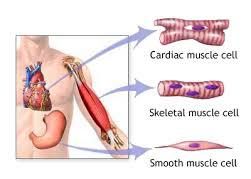If you’re in the gym then you probably have one of two goals: to burn fat or to build muscle. Or perhaps your goal is a combination of the two. Are you finding that you are lifting weights but struggling to pack on the size? Well in this post I am going to look a little deeper into the reasons why our muscles grow, giving you something to think about next time you pick the dumbbells up.
There are 3 different types of muscle within our bodies:
- Cardiac (heart)
- Smooth
- Skeletal
Today, we are focusing on the last one of these, Skeletal muscle. So, there are 650 Skeletal muscles within our bodies and each one of these are told to contract by motor neurons. The better your body is at processing the messages given to your muscles by motor neurons the stronger you will be. Have you seen the skinny guy at the gym who is deceptively strong? He can process these messages more efficiently and is therefore stronger than he looks.
When you lift weights you are causing your muscles to contract. In turn, these muscle fibres will get torn by the stress of the weight being lifted. After your workout, your body will fuse together these damaged fibres to form new stronger ones. The repaired muscles fibres will be thicker than the previous ones to create muscular hypertrophy.
How do I make my muscles grow?
To make your muscles grow you have to put them under stress to disrupt homeostasis. This then causes 3 main factors which cause muscle growth:
- Muscle Tension
- Muscle Damage
- Metabolic Stress
Muscle Tension
In order to build muscle you have to be able to put them under a greater amount of stress than they have previously adapted to (progressive overload). This means continually increasing the amount of weight you are lifting to give the muscle a new stimulus to respond to.
Muscle Damage
If you have ever felt sore after your workout then you have experienced muscle damage. However, that is not to say if you don’t feel sore then you havent caused muscular damage. Typically, over time other mechanisms will come into place to reduce soreness however the damage to the muscle fibers has still been caused, allowing then to fuse and re-grow bigger and stronger.
Metabolic Stress
If you have ever had a good “pump” after your workout then you have encountered Metabolic Stress. Sarcoplasmic hypertrophy is the swelling of the cells around the muscle which can give the appearance of increased muscle size without an increase in strength.
What role do hormones play in muscle growth?
The two most vital hormones in promoting muscle growth are:
- (IGF)-1 – Insulin Growth Factor
- Testosterone
IGF will enhance protein synthesis, facilitate glycogen uptake and repartition the uptake of amino acids to skeletal muscle. IGF is naturally produced within your body and a healthy diet will help to promote IGF production.
Testosterone is also naturally produced within the body and has many more health benefits other than aiding muscle growth. It increases protein synthesis, inhibits protein breakdown, activates satellite cells, and stimulates other anabolic hormones. Strength training not only releases more testosterone but also makes the receptors in your muscle cells more responsive to it.
Why rest is important
If you do not provide your body with adequate rest or nutrition then you can go from being in a state allowing muscle growth (anabolic) to a state leading to the breakdown of muscle tissue (catabolic). When you sleep, your muscle’s repair themselves and the damaged muscle fibres fuse together bigger and stronger. However, if you do not allow your body to do this then the fibres won’t repair themselves. So taking rest days and getting enough sleep is vital if you are looking to grow.
Muscle Growth: Conclusion
It’s hard to say what the most important factor leading to muscle growth is because it is caused by a number of factors coming together. By weight training you are breaking down the muscle fibres then when you rest you allow those fibres to repair but only if you are eating the right foods to take in the right nutrients and you are getting enough sleep for this to happen.